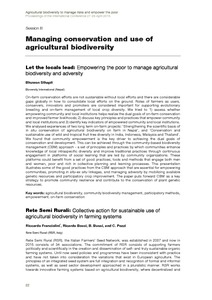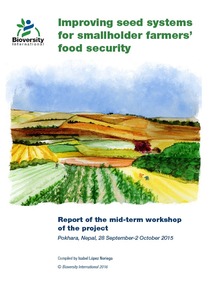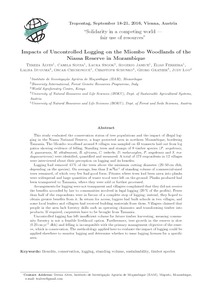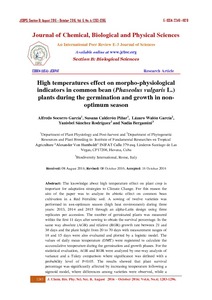Location
Bioversity International is a global research-for-development organization. We have a vision – that agricultural biodiversity nourishes people and sustains the planet.
We deliver scientific evidence, management practices and policy options to use and safeguard agricultural and tree biodiversity to attain sustainable global food and nutrition security.
We work with partners in low-income countries in different regions where agricultural and tree biodiversity can contribute to improved nutrition, resilience, productivity and climate change adaptation.
Members:
Resources
Displaying 46 - 50 of 184Let the locals lead: empowering the poor to manage agriculture biodiversity in farming systems
Integrating wild and agrobiodiversity conservation
This research shows that both wild biodiversity and agrobiodiversity provide multiple ecosystem services that support food production, underpin food security and human wellbeing. We consider that biodiversity conservation efforts in agricultural contexts should better integrate wild and agrobiodiversity approaches
Improving seed systems for smallholder farmers' food security. Report of the mid-term workshop of the project
The project "Improving Seed Systems for Smallholder Farmers' Food Security" aims to contribute to a future in which farmers successfully use crop diversity to ensure their food security and that of their communities, to thrive in challenging conditions and to make their farms resilient. The project addresses to particular issues vital to this goal: i) crop diversity available for farmers through seed systems; and ii) the policies that regulate such systems.
Impacts of uncontrolled logging on the Miombo woodlands of the Niassa reserve in Mozambique.
This study evaluated the conservation status of tree populations and the impact of illegal logging in the Niassa National Reserve, a huge protected area in northern Mozambique, bordering Tanzania. The Miombo woodland around 8 villages was sampled on 43 transects laid out from log patios showing evidence of felling. Standing trees and stumps of 8 timber species (P. angolensis, A. quanzensis, M. sthulmannii, B. africana, C. imberbe, D. melanoxylon, P. angolensis and S. madagascariensis) were identified, quantified and measured.
High temperatures effect on morpho-physiological indicators in common bean (Phaseolus vulgaris L.) plants during the germination and growth in non-optimum season
The knowledge about high temperature effect on plant crop is important for adaptation strategies to Climate Change. For this reason the aim of the paper was to analyze its abiotic effect on common bean cultivation in a Red Ferralitic soil. A sowing of twelve varieties was performed in non-optimum season (high heat environment) during three years: 2013, 2014 and 2015 through an alpha-Latin design using three replicates per accession. The number of germinated plants was measured within the first 11 days after sowing to obtain the survival percentage.






